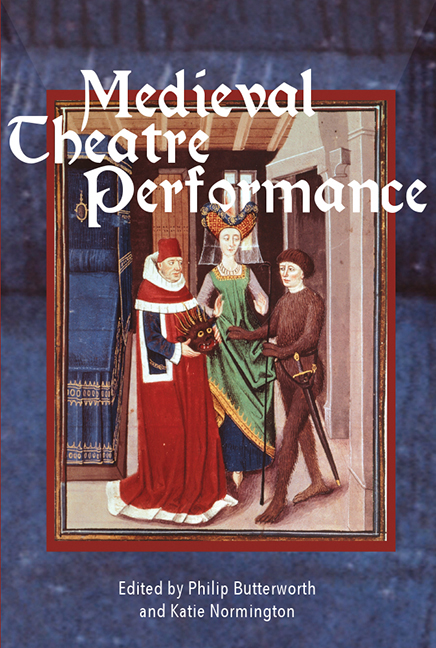Book contents
- Frontmatter
- Dedication
- Contents
- List of Illustrations
- Contributors
- Abbreviations of Principal Sources Cited
- Introduction
- Synopses
- 1 From Archive to Repertoire: The Disguising at Hertford and Performing Practices
- 2 Walk, Talk, Sit, Quit? On What Happens in Netherlandish Rhetoricians’ Plays
- 3 Performing Intrusions: Interaction and Interaxionality in Medieval English Theatre
- 4 Player Transformation: The Role of Clothing and Disguise
- 5 Pavilioned in Splendour: Performing Heaven in Fifteenth-Century Florence
- 6 Living Pictures: Drama without Text, Drama without Action
- 7 Performer-Audience Relationships in Fifteenth- and Sixteenth-century Danced Spectacles
- 8 Decadance in the Late Middle Ages: The Case of Choreomania
- 9 Writing, Telling and Showing Horsemanship in Rhetoricians’ Farce
- 10 Inanimate Performers: The Animation and Interpretive Versatility of the Palmesel
- 11 ‘lyke unto a lyvelye thyng’: The Boxley Rood of Grace and Medieval Performance
- 12 The Mechanycalle ‘Ymage off Seynt Iorge’ at St Botolph's, Billingsgate, 1474
- Bibliography
- Index
Introduction
Published online by Cambridge University Press: 21 August 2018
- Frontmatter
- Dedication
- Contents
- List of Illustrations
- Contributors
- Abbreviations of Principal Sources Cited
- Introduction
- Synopses
- 1 From Archive to Repertoire: The Disguising at Hertford and Performing Practices
- 2 Walk, Talk, Sit, Quit? On What Happens in Netherlandish Rhetoricians’ Plays
- 3 Performing Intrusions: Interaction and Interaxionality in Medieval English Theatre
- 4 Player Transformation: The Role of Clothing and Disguise
- 5 Pavilioned in Splendour: Performing Heaven in Fifteenth-Century Florence
- 6 Living Pictures: Drama without Text, Drama without Action
- 7 Performer-Audience Relationships in Fifteenth- and Sixteenth-century Danced Spectacles
- 8 Decadance in the Late Middle Ages: The Case of Choreomania
- 9 Writing, Telling and Showing Horsemanship in Rhetoricians’ Farce
- 10 Inanimate Performers: The Animation and Interpretive Versatility of the Palmesel
- 11 ‘lyke unto a lyvelye thyng’: The Boxley Rood of Grace and Medieval Performance
- 12 The Mechanycalle ‘Ymage off Seynt Iorge’ at St Botolph's, Billingsgate, 1474
- Bibliography
- Index
Summary
The title of this work, Medieval Theatre Performance: Actors, Dancers, Automata and their Audiences, arises from a concern about what actors (players), dancers and automata did and the way they did it in their respective contexts. When we were formulating and preparing our book European Theatre Performance Practice 1400–1580 (Farnham: Ashgate, 2014), we became aware of the dearth of research into medieval theatre, dance, puppetry and automata in performance. We were aware of a considerable amount of research that had been conducted into performance contexts but not performance itself. Scarcity of relevant evidence perhaps offers a reason for such deficiency to date. This work therefore attempts to go some way towards rectifying this perceived omission.
The contributors have been asked to answer (or attempt to answer) questions such as: What was the nature of performance in theatre/dance/puppetry/ automata? What were the performed qualities of such events? What were the conventions of performed work? What took place in the act of performing? What were the relationships between performers and witnesses? What conditioned these relationships? We recognise that these are tough questions for our contributors to tackle but we strongly believed that such toughness would stimulate and bring about some original research that would lead to significant contributions to knowledge. We have therefore invited selected international specialist colleagues to investigate the nature of performance by players, dancers and automata in order to extend the boundaries of our knowledge.
Given these distinctions, it is performance and not performance context with which we are concerned unless, of course, the latter contextualises the former. With this kind of difference in mind, Claire Sponsler adopts the useful approach of stating ‘What we know’ and ‘What we do not know’ in relation to performance, its nature and investigation. She poses the paraphrased question: ‘Why should theatre historians care about performance practices?’ Other contributors use different ways of pursuing their examination of performance issues. In Nerida Newbigin's chapter, discussion of the performance context is a springboard into the examination of the conditions of performance.
- Type
- Chapter
- Information
- Medieval Theatre PerformanceActors, Dancers, Automata and their Audiences, pp. 1 - 10Publisher: Boydell & BrewerPrint publication year: 2017



